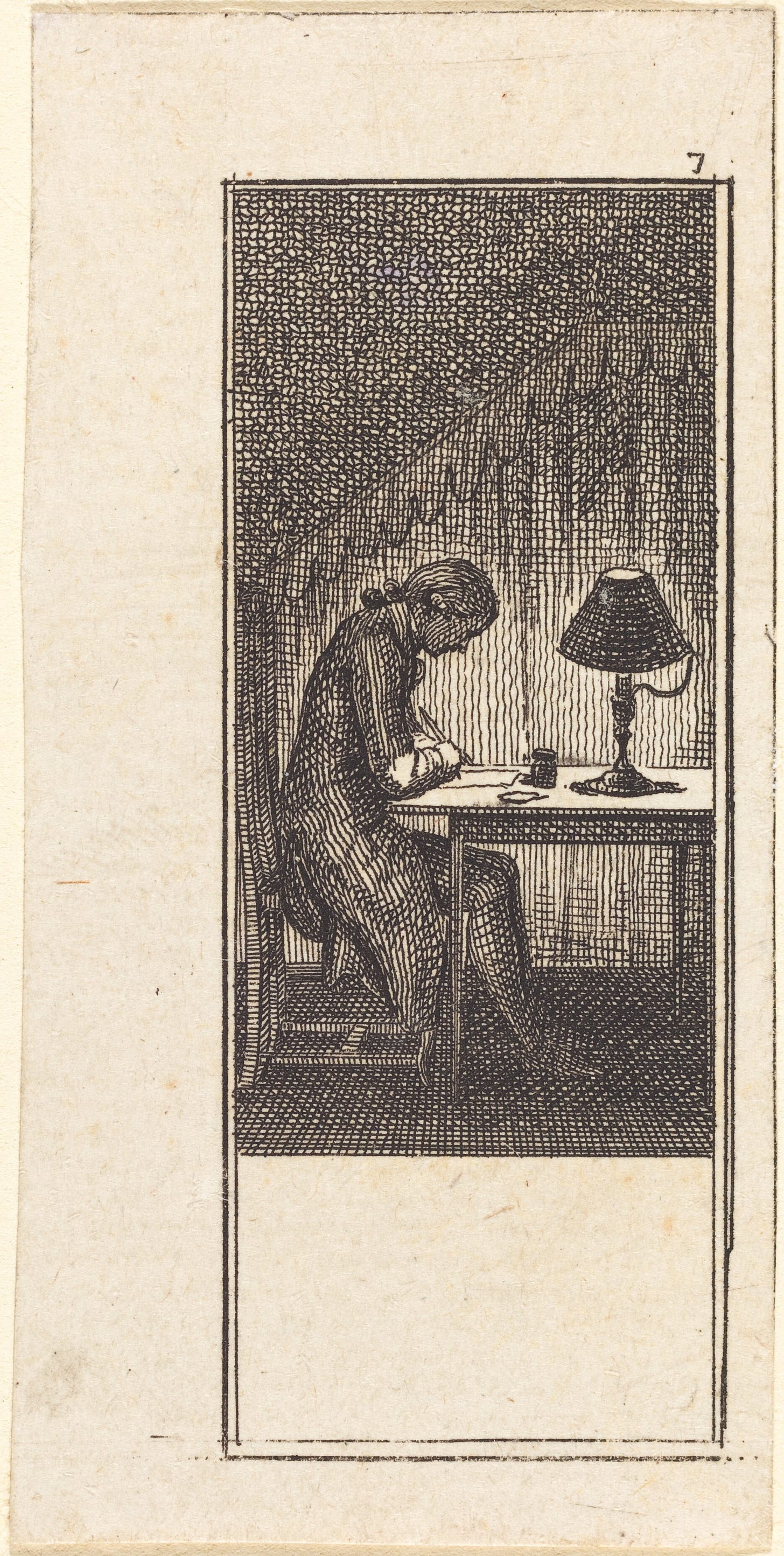
Dear readers,
I have missed you all, and hope you are well. It felt good to step back from the news and the mayhem for a bit. I increasingly feel the need to turn, amid the instantaneous and the fast-paced, the hot takes and the outrage, toward lasting and permanent things. This Substack will continue to hold space for those things—and for those eager to discuss and apply them.
In other news, we made it through another homeschool year. We hiked, skied, swam, canoed, camped, painted, and baked. We did math on the trampoline, and read aloud in forts. My oldest started a sourdough business; my middle child helped in the garden. There were also moments of complaining about aforesaid math and whining about spelling tests. We made it through, with new lessons in kindness and fortitude to share and remember.
Parenting and teaching takes up much of my time and energy. But I’ve had a few writing projects under construction, and look forward to sharing them with you all. My Hannah Coulter speech, for the McConnell Center, has already been published here. I also had the immense honor of giving a speech in Tanya Berry’s honor at The Berry Center this March. I hope to share some excerpts from that work at some point. Finally, I’ve written a long essay on the dignity of work and naming for the University of Florida’s Christian Study Center, and will re-post it here once the print version is published.
In the meantime: a post just for you all, on a topic that I would love to discuss in this community. My last few years of working with high school and college students has forced me to reckon with AI. I often wonder what AI will mean for our kids and their peers in the next decade or so. What follows are my initial reckonings with AI, in conversation with these young people and the people who parent and teach them. I hope you will share your own thoughts in the comments.
Cheers,
Gracy

You would be hard pressed to miss the current conversation surrounding artificial intelligence (AI). It is everywhere: dramatically altering academia, revolutionizing the business world, and quickly transforming coding and mathematics. It’s even infiltrating the restaurant industry. Everyone—or almost everyone—sees AI as the future, an inevitable result of human progress. Most believe AI will therefore help rather than harm us. Pew has found that many are enthusiastic about AI’s potential impact on public health, engineering, agriculture, and the energy sector (to name a few). Apple says its AI services will help “you write, express yourself, and get things done effortlessly.”
That last bit—effort, or the lack thereof—is a big deal for the young people drawn to AI. Artificial Intelligence offers ease: a quicker, simpler way to do things. It promises shortcuts, simplified processes, and eased beginnings, without compromising the end product. Indeed, the end product might sound or look better than it would have if you had done it yourself. This is what convinces most students to use AI. Many are tired and stressed. Many are overwhelmed. And perhaps some of them are just plain lazy. But honestly, if your computer can write essays for you, why should you even bother?
That last appeal (of eased beginnings) is one that resonates deeply with my own experience as a writer. I hate beginning an essay, book, or article. If I am honest, I would do almost anything to avoid this moment—right here—where I begin to put pen to paper. (Or, in this case, fingers to keyboard.) Most writers would say the same, I think. Few enjoy starting a piece of writing.
So why not use AI to ease the process? To write our emails, our newsletters, our essays? Why not allow AI to take care of those bits of coding that are particularly mind-numbing, or the spreadsheets we do not want to make? As one friend recently put it, AI offers to free us from the mundane so that we can make art and embrace what truly matters. It’s a time saver, a brain and effort saver.
But is it?
I am actually a fan of the mundane, and therefore struggle to find this particular argument appealing. Madeleine L’Engle and Kathleen Norris have won me over on this point. Both authors suggest that the quotidian labors of our lives are those spaces in which we truly embrace both being and becoming. In the mundane, we neither achieve the grand nor the easy—and that’s the point. The mundane is humbling, in a way that reminds us of the word humus, or earth. (The thing that, in the Genesis account, we ourselves are shaped from.) The word mundane comes from the Latin mundus, or “world.” The work of the mundane is thus the work of the world.
While doing the mundane, we lose ourselves in process and place. The mundane roots us in the present, stubbornly refusing the demands of clock or calendar. It will take as much time as it requires. And so we pull at a thread of argument, uproot weed after weed, or sweep every nook and cranny until the room is clean. We sink into a new experience of time and place, in which everything diminishes but the now and here. Ironically (and sometimes, maddeningly) we may have to do it all again: Sit down to rewrite, hone, edit, and polish. Return to the nasty weeds that pop up day after day. Tackle the dust and grime of another week. Yes, the mundane is not always pretty. What these experiences shape is not always a finished product that we can hold up and boast about. Sometimes, yes. But not always. What is always true is that these processes are shaping and honing us. They are showing us who we are, how to be, and what it means to think and live. The work of the mundane tethers us to place, to our bodies, to the people we love and live with, and—perhaps in a way I never realized before AI—to our minds themselves.
Yes, mundanity matters to the mind.
Because it’s the process of slogging through an argument—feeling out its contours and edges, remolding and reshaping them like a potter—that teaches us how to think. Strong arguments do not spring fully formed from the mind. They simmer and stew. They emerge half-formed, and have to be reshaped. Essays materialize when you start to write, and realize you did not yet know what you thought. In the process of verbalizing thoughts, there is room to grow, stretch, and challenge the mind. There is even room to change your mind. AI short circuits this opportunity—in giving us what we ask for, it in fact steals opportunities for growth. It cheats the process of becoming that the mundane offers.
In her book Walking on Water, L’Engle notes the following of work, specifically of that work we consider drudgery:
“… One problem with the word work is that it has come to be equated with drudgery, and is considered degrading. Now, some work is drudgery though it is not always degrading. Vacuuming the house or scrubbing out the refrigerator is drudgery for me, though I find it in no way degrading. And that it is drudgery is a lack in me. I enjoy the results and so I should enjoy producing the results. I suspect that it is not the work itself which is the problem but that it is taking me from other work, such as whatever manuscript I am currently working on. Drudgery is not what work is meant to be. Our work should be our play.”1
L’Engle perfectly elucidates the slippery, dangerous way we immediately equate mundanity or “drudgery” with the demeaning. It is a waste of our time, we reason, to clean the house, pick up dog poo, or wipe snotty noses. It is a waste of our time to sit down and complete school assignments we do not particularly care for. The mundane is seen as “beneath us.” The student who refuses to write an essay is, whether consciously or no, succumbing to this very attitude. They have decided already that this paper or assignment is less than worthy of their time—and they treat it accordingly.
But what if the mundane is actually what makes us human? What if placed, present habits are the ones that truly shape our hearts and heads? What would happen if we refused to see them as degrading, and instead embraced L’Engle’s levity and life? What if we were to see these things, in fact, as play?
I think of the scattered forming of sentences, playing with them, deleting them, remaking them: it’s a form of “drudgery,” if you want to see it that way. It is also playful. The process refines my thinking. It demands all of me. Time slips away as I focus on it. What do students lose when they let AI do all of the initial writing, and then slip in at the end to do a slight edit? Some might say they haven’t done the real work, and they would be right. But L’Engle seems to suggest that they’ve also missed out on all the play.
To Kathleen Norris, meanwhile, chores like washing dishes are spaces in which God shows us His love:
“Is it not a good joke that when God gave us work to do as punishment for our disobedience in Eden, it was work that can never be finished, but only repeated, day in and day out, season upon season, year after year? I see here not only God’s keen sense of humor, but also a creative and zestful love. It is precisely these thankless, boring, repetitive tasks that are hardest for the workaholic or utilitarian mind to appreciate, and God knows that being rendered temporarily mindless as we toil is what allows us to approach the temple of holy leisure.”
Norris suggests here that the moments in which we simply are remind us that there is nothing we can really achieve or prove to God. The workaholic and the utilitarian, the important CEO and the famous celebrity, must do those simple, thankless tasks that remind them they are but dust. At the end of the day, “What do people gain from all their labors at which they toil under the sun? Generations come and generations go, but the earth remains forever.” At the end of the day, there is only “Be still, and know that I am God.” This may sound a bit depressing—at least to the workaholics, and to those who hope to achieve some permanent prize as a result of their labor. But Norris means this as a comfort. Note here that the very forms of work AI promises to free us from—“thankless, boring, repetitive tasks”—are those Norris identifies as vital to our spiritual and mental wellbeing. The mundane tasks are, ironically, the life-giving ones. Without them, we lose a sense of our true identity and worth: not as productive beings, but simply as beings.
Of course, one might argue, the human who no longer has to labor over an essay or email is a human free to read a book, to paint a picture, or to go hiking in the mountains. Isn’t AI liberating us from the workaholism Norris mentions? Isn’t it freeing us to use our minds and bodies as God intended? To pick and choose those forms of leisure and mundanity best suited to human flourishing?
It’s a good point. The worker freed from coding gets to spend more time with family, say. The teacher freed from grading and email can now study his or her curriculum in greater depth. Savvy, mature users of AI will probably use AI in much the same way I use a dishwasher: it takes some of the work out of the process, but you’re still washing, tidying, and putting stuff away. Mature users might check AI’s copy the same way I check my washed dishes: to make sure the the machine is doing its job. I definitely see the appeal. And I won’t deny that measured, careful usage along these lines might help some folks. Maybe it will even improve some individual’s writing through observation and editorial practice. Who knows?
But for students, scholars, and writers, I must still object to the use of AI. I think the unchosen mundane is good for us. I think it is often where the real thinking and the real work happens. The process is shaping the actual product, which is us. Not really the finished essay. The essay is an outward sign of an inward process. It chronicles a saga that is still taking place—indeed, taking place all the time. And insofar as it is a relational and contextual process, we risk greater loneliness and isolation without it. We risk not only our own maturation (in mind and soul), but also the maturation of our relationships: with mentors, teachers, colleagues, and friends.
Ultimately, the saddest aspect of AI writing in academia, to my mind, is the fact that it removes opportunities for humans to truly relate their thoughts—to explain and share who they are, and what they think, with others. There is definitely room for reform here in how we assign writing on college and high school campuses. Perhaps what will emerge from this AI crisis will be less “busy work,” and less essay prompts that fail to inspire the writer. But there is something good and beautiful in the essay: something that will be entirely lost if students stop writing them. The essay presents an opportunity for both teacher and student to learn what the student is truly thinking. It is a treasure, as the student grows into their thoughts. Sadly, a lot of professors see these essays (and the grading of them) as demeaning drudgery. I wonder how many students are influenced to use AI because they intuit this: they know their teachers and professors do not really care about the finished product, and dread having to assess them. If the person you are writing for does not even want to read what you think, why bother? Doubtless there are students influenced toward AI for all the other reasons mentioned earlier. But I do think there is more capacity for imagination and tenacity when you know your audience actually cares.
Others might argue that this applauding of the mundane does not have any real bearing on the world AI is remaking, as the mundane will always be with us. If AI removes certain mundanities, new ones will emerge. This is an interesting assertion. But I do worry that if we constantly emphasize ease and efficiency, we will reshape our desires and habits. We will no longer have room in our lives for the mundane, whatever it may be. (In many ways, this is already true—no one speaks of “drudgery” in the reverent way L’Engle does.) We will not seek out the mundane when it does return to us, in whatever form it appears. As so often happens, even now, we’ll turn to entertainment, “doomscrolling,” and distraction before we turns our heart and habits toward the mundane. Such an outcome would be tragic, for ourselves and our world.
The writing of this newsletter took place during a handful of seized moments in the afternoon, as my children read books, watched shows, or played soccer in the backyard. The topic has percolated in my head as I washed dishes, swept the floor, and revisited the works of L’Engle and Norris. It emerged in conversations with my friends, relatives, and spouse. It was by no means easy or fast. And I am still unhappy with its imperfections. An AI-composed essay might be cleaner, more eloquent.
But isn’t that truly life? We stretch and learn—never perfectly. But perfection is not the point. Discovery, relationship, and growth: those are the point. And they are found in everyday processes and habits: in the “mundane” itself.
A question or two for you, the reader who has made it thus far:
Does the mundane matter?
What is the purpose of AI, in your words? How does it help or hurt humans? What might be done to prevent its harms?
In the world of writing and scholarship (such as academia and schools), how should we approach the problem of increasing AI usage?

news + essays
Alasdair MacIntyre has passed away. His book After Virtue has had a significant impact on my own life and thought—for his explorations of Aristotle and Austen, perhaps most importantly. I have memorized MacIntyre’s pithy explanation of Aristotle’s eudaimonia, and think of it often: “being well, and doing well in being well.” May we all seek such happiness. Read some tributes in MacIntyre’s honor here, here, here, and here.
Jonathan Malesic declares that Chat GPT is a gimmick: “The infrastructure demanded by AI is neither neutral nor cheap. It has well-known environmental costs, given the vast amount of electricity and water its data centers demand. Nor is the infrastructure only physical. It has already been built in the minds of students, who are becoming informational lotus-eaters, addicted to immediate, effort-free homework answers and adequate-seeming essays on demand.”
Nicholas Carr on AI and students: “We’ve been focused on how students use AI to cheat. What we should be more concerned about is how AI cheats students.”
Clare Morell profiles families who have rejected smart devices: “What these families had in common was that they were not alone. They sought out other families who shared similar values and a desire to give their children an embodied, real-world childhood free of screens.”
Casey Spinks defends frugality: “The saint, as a receiver of his sufferings, is an owner of them. And as an owner, he is free. I can say he freely gets the present. He receives the present, even its present lack, as a present—a gift. Sufficient to the day is the evil thereof.”
Praying for those in LA: for wisdom, for peace, for justice. Nancy Rommelmann’s article, describing events and people on the ground, gives a sense of the tensions and fears present there. (H/T Bonnie Kristian)
books
I Cheerfully Refuse, Leif Enger
Having read Enger’s Peace Like a River at long last, I immediately launched into this novel. Several friends have praised it highly. It’s a fascinating dystopian work: set in a world in which the United States president is proudly illiterate, humans are skeptical of books and learning, and most feel despair for the future. Enger prompts the reader to ask, “What is hope, and how do we safeguard it?”
The Vanderbeekers of 141st Street, Karina Yan Glaser
It’s been a long time since I’ve read a children’s book that brought such delight and warmth to our home. Glaser tells the story of a family of seven in Harlem—a family characterized by wit, sparkle, joy, and love. When their gloomy and reclusive landlord declares that he will not renew the family’s lease, the five Vanderbeeker children embark on a quest to change his mind. The result is a beautiful homage to family, empathy, and neighborliness. The kids and I loved every minute, and can’t wait to read the next book in the series. I first heard about Glaser’s work through her Q&A with Tish Harrison Warren, and strongly recommend reading their conversation on faith, writing, community, and compassion (among other things).

food + drink
This smashed raspberry white chocolate layer cake won acclaim and praise from family and friends. 10/10.
It’s nearly time for one of our favorite summer dinners: BLT Bowls.
The dinner I make on our 90+ degree summer days: Greek Pasta Salad. (Served with lots of fresh arugula from the garden.)
Making Molly Yeh’s matcha crepe cake tomorrow. Excited in advance.
listening
Jon Batiste’s Beethoven Blues on repeat.
After living in Virginia for 10+ years, I became a bluegrass convert. Now it’s what I listen to in the summer. Currently enjoying albums by Sierra Hull and Shadowgrass.
Madeleine L’Engle, Walking on Water: Reflection on Faith and Art (Colorado Springs: Waterbrook Press, 2001), 199.



In response to your question of whether the mundane matters: last night in conversation with my husband, I got to hear from him all the steps forward his career and faith have taken in the last years, and how exciting it is to him (and to me!) I did feel a moment of self pity for all the dreams I've put in hold for him and for our family, but even those goals and hopes are slowly unfolding, and I realized then that every step forward I've taken has grown out of a faithfulness to the mundane, ordinary, humble parts of my life. I could probably write much more, but I'm summary, the mundane matters so much, and I'm slowly learning to be grateful for it.
I agree with what others have said here. So much of our lives are lived in the mundane, and there is such beauty and grace in the ordinary -- in simple dinners, in changing diapers, in slow family walks. There is nothing earth shattering or spectacular about sitting on my back deck drinking a cup of coffee, but there is contentment I find when I close my eyes and listen to the birds. I would also argue that the mundane ultimately leads to mastery. We learn to read by first learning and practicing the look and sounds of each letter, which is (for my children at least) a tedious task. But from there, you learn to put the sounds together, and ultimately sentences, and eventually, great works of literature. I think AI, and many forms of modern technology, instead of taking away "drudgery" from us, are taking us away from what makes us human -- critical thinking, curiosity, contemplation, creativity, connection.
In the world of scholarship, I see no option except to eliminate Ed Tech. I won't speak to academia so much as my thoughts are more geared these days to K-12 education. But it has done no good for today's students, and I see much harm.